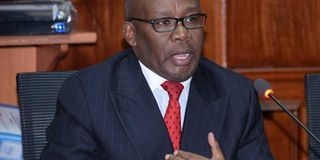AG requests ICC to dismiss victims' appeal over Kenya non-compliance ruling

Attorney-General, Githu Muigai. Women leaders want him to take a leading role in the implementation of the one third gender rule. PHOTO | SALATON NJAU | NATION MEDIA GROUP
What you need to know:
- Prof Muigai argued that the victims failed to demonstrate the essential requirements for the Appeals Chamber to review the decision, which was made in December 2014.
- Through their lawyer, Fergal Gaynor, victims represented in the case against President Uhuru Kenyatta claimed the reasons used by the Trial Chamber to make their decision were “invalid”.
- Ms Bensouda wants action to be taken against Kenya for alleged non-cooperation, which she says led to the collapse of the President’s case at the ICC.
The Attorney-General Githu Muigai has asked the International Criminal Court (ICC) to dismiss an appeal by poll violence victims to have Kenya declared non-compliant.
The 2007 post-election violence victims want the ICC’s Appeals Chamber to vacate a decision by the Trial Chamber not to refer Kenya to the Assembly of State Parties.
The decision followed complaints of non-cooperation by ICC Prosecutor Fatou Bensouda.
Prof Muigai argued that the victims failed to demonstrate the essential requirements for the Appeals Chamber to review the decision, which was made in December 2014.
“The Trial Chamber considered the 'Prosecution’s concession that the evidence fell below the standard required for trial and that the possibility of obtaining the necessary evidence, even if the revised request was to be fully executed, is still nothing more (than) speculative’.
“The Trial Chamber was not persuaded that a referral to the assembly would have facilitated a fair trial or the interests of justice, and thereby did not find it appropriate to further and unnecessarily prolong the proceedings,” said Prof Muigai.
Through their lawyer, Fergal Gaynor, victims represented in the case against President Uhuru Kenyatta claimed the reasons used by the Trial Chamber to make their decision were “invalid”.
They said there is a risk of non-committal by the government in other cases if no action will be taken.
The Trial Chamber terminated the case against President Kenyatta in March, although the one against Deputy William Ruto and journalist Joshua arap Sang is ongoing.
ARREST WARRANT
A warrant of arrest was issued against journalist Walter Barasa, who is alleged to have interfered with prosecution witnesses.
“If State interference with the collection of evidence emerges as a viable strategy in this case, this will almost certainly increase the likelihood that it will infect other cases.
“Left unrestrained, State obstruction of justice can and will defeat the Rome Statute’s structure of investigation and prosecution. This cannot be permitted to stand,” said Mr Gaynor.
Prof Muigai reiterated the government’s position that it was the mandate of the Prosecution to investigate its cases sufficiently and only resort to State Parties’ cooperation for assistance.
“This will ensure that the Prosecution does not transfer its primary responsibility of investigating and prosecuting to a State Party, as it has sought to do on the Republic of Kenya, by making requests for assistance which are incapable of implementation as they offend the framework of cooperation as set out in the Rome Statute and the national procedures of the relevant State Party requested to execute the requests for assistance,” he said.
Ms Bensouda wants action to be taken against Kenya for alleged non-cooperation, which she says led to the collapse of the President’s case at the ICC.
According to her, the government failed to help in collecting crucial documents that might link the President to allegations that he aided in organising attacks against people who were believed to be ODM supporters after the 2007 General Elections.
However, she has often been challenged by the President, through his lawyers, for engaging in a “fishing expedition”.
Her appeal has been supported by victims represented in President Kenyatta’s case, as well as the Africa Centre for Open Governance (Africog), which was enjoined as an amicus curiae.





